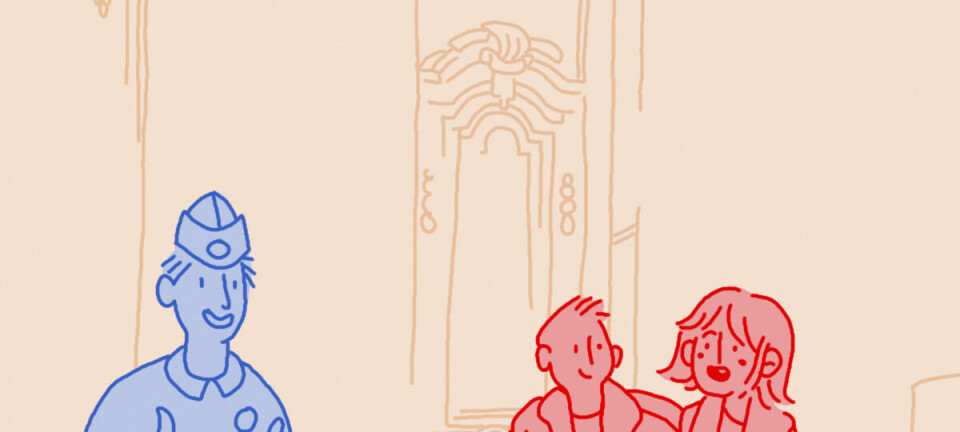article> International
The Steward, your friend

They are very active these days at Pangaea, the meeting centre for internationals, which makes sense since KU Leuven has a stunning 10,898 international students this year.
Originally written in Dutch for Veto by Pieter Jespers
Translated to English for The Voice by Gwynne van Kaauwen (Contributing Writer)
Originally published on October 28, 2019
The 3932 internationals who registered for a bachelor or master for the first time, correspond to an increase of almost 20% compared to the amount of new internationals at the same time last year (according to a count from October 17, 2019).
The more the merrier
A lot of students can mean a lot of parties. Even though the international turn out at the steward training was very low (five people), international students can safely organise these parties themselves. “It’s often Belgian students who work at Pangaea and steward,” says Stephanie Homans, student cop for international students.
According to her, there were only Belgians in the past. Later on they came up with the idea of an English speaking training for stewards. “We have been giving it for three years now and twice a year. The first time there were only two attendees.” There is thus a (small) positive evolution in the amount of English speaking stewards to be noticed.
The fakbarcode
The fakbars committed themselves in 2014 to what is called the ‘fakbarcode’; an agreement between the fakbars of the various student associations and LOKO, KU Leuven, the municipality of Leuven and the police. This code on the one hand tries to give fakbars a statute, and on the other hand wants to minimize the nuisance from a fakbar in the neighbourhood. As long as the fakbars comply with these rules they get a fakbar-label in exchange.
“At Pangaea they have even stricter rules. In the fakbarcode 11 pm is stipulated as the starting time, but they start at 10 pm.”
Stephanie Homans, student cop for internationals
The stewards are crucial when it comes to enforcing these criteria; they are always students and always in pairs (at least). They have a well-defined set of tasks: checking the entrance by demanding student cards, making sure no glasses or alcoholic drinks get taken outside the fakbar/the event, preventing bicycles or queues from blocking public roads or the sidewalk, maintaining the peace at the fakbar/the event and, if necessary, alerting the police. Stewards are also always the point of contact for fellow students and emergency services. They know the situation and have to be sober at all times.
“At Pangaea they have even stricter rules,” Homans adds. “In the fakbarcode 11 pm is stipulated as the starting time, but they start at 10 pm. When they are with fifty people, they use stewards. The parties end at 2 o’clock, so the stewards usually do one steward shift of four hours.”
The neighbourhood is grateful
The stewards watch over the immediate surroundings: a radius of 20 meters starting from the entrance of the fakbar of the event. This means that also the neighbourhood can come to them, sometimes with complaints, but also with a lot of gratitude. People in the surrounding area know that the steward is trying to protect their night’s sleep.
Public drunkenness can result in 12 hours of deprivation of liberty and a considerable fine

Last year, 2348 cases of nuisance were registered by the Leuven police. People in a fakbar talk very loudly to be understood over the loud music. Outside, they often forget to tune it down again. In addition, there were 862 cases of public drunkenness in 2018.
The most important features the police uses to identify you as potentially drunk are bloodshot eyes, throwing up, self-urination or being sprayed with other liquids, talking unintelligibly, not being able to walk in a straight line and a distorted sense of time or location. So, warn your friends! It could save them 12 hours of deprivation of liberty and a considerable fine.
Moreover, according to Homans, the people who followed the training are more permanent: “I notice that the students who do the steward training, are also the ones making coffee at Pangaea. Most of the time they are students who study in Leuven for multiple years. They face the engagement towards Pangaea with voluntary work, they take the steward shifts as a part of that.”
Homans regularly visits Pangaea, sometimes to direct something. “The last couple of years we actually didn’t receive any complaints from the neighbours. When I started - it’s my seventh academic year - Nick (Vandenbussche, ed.) was still a student cop. Back then there were occasional complaints from the neighbourhood. Now they have noise meters, there is a new board and there are stricter rules.”





